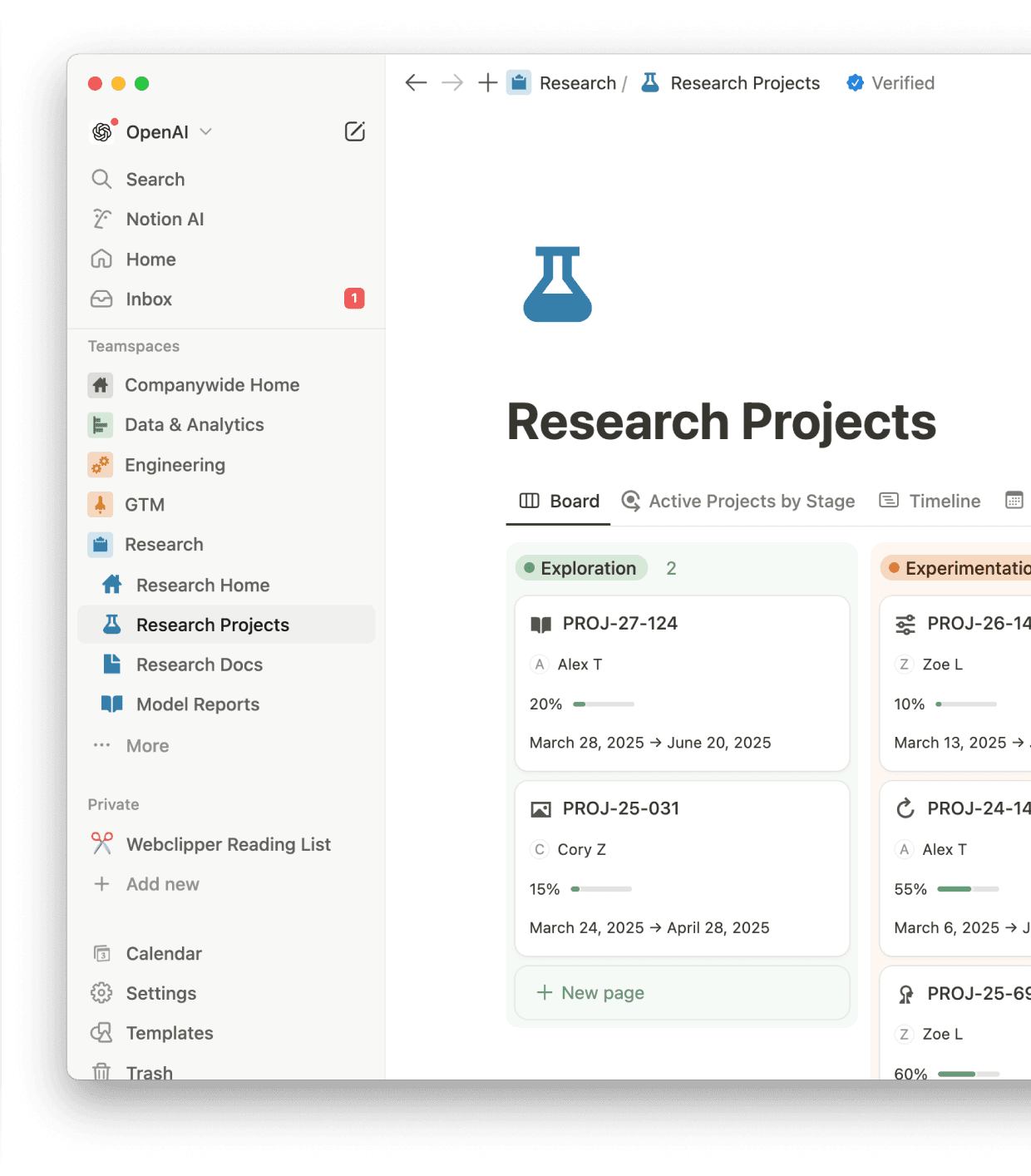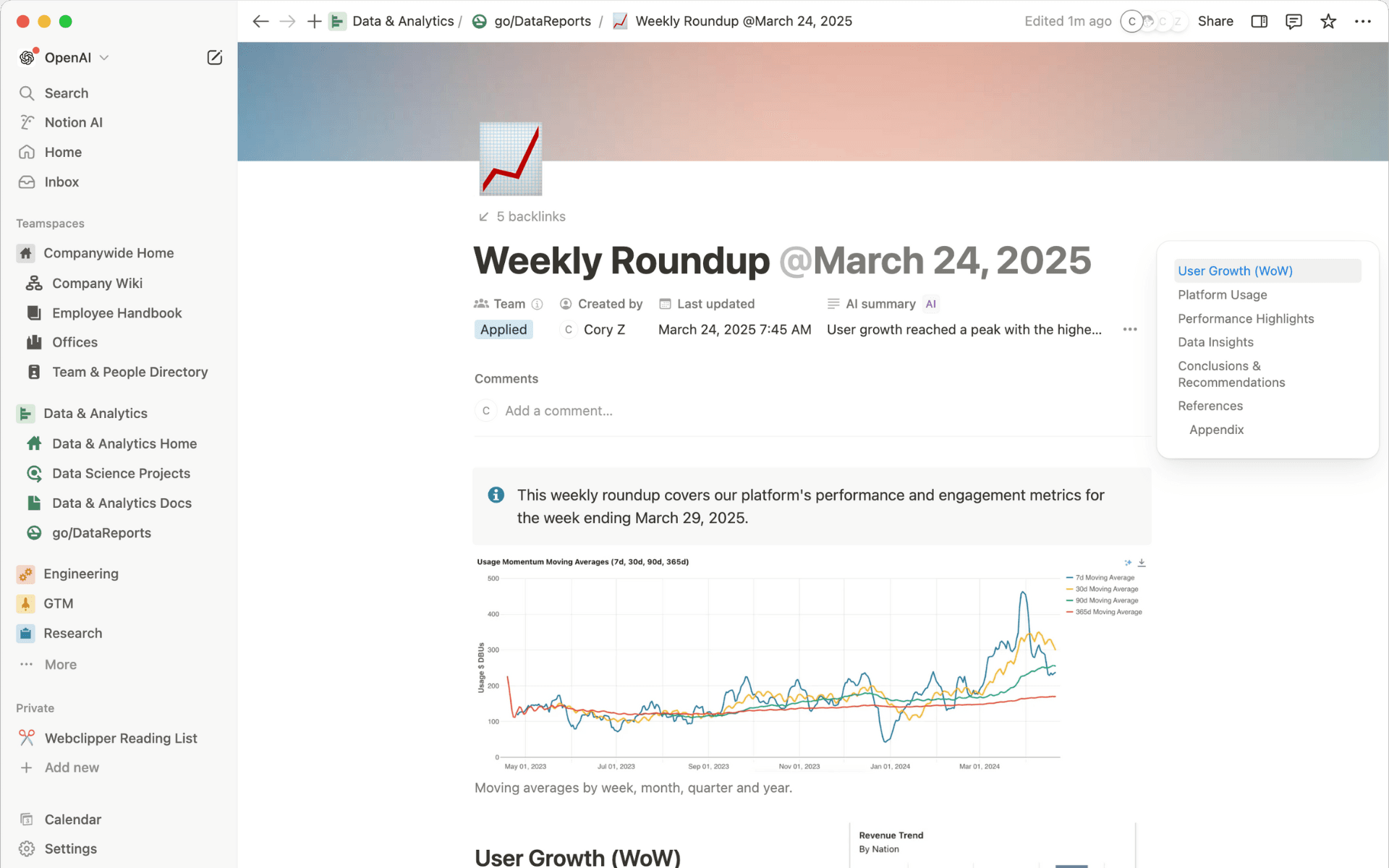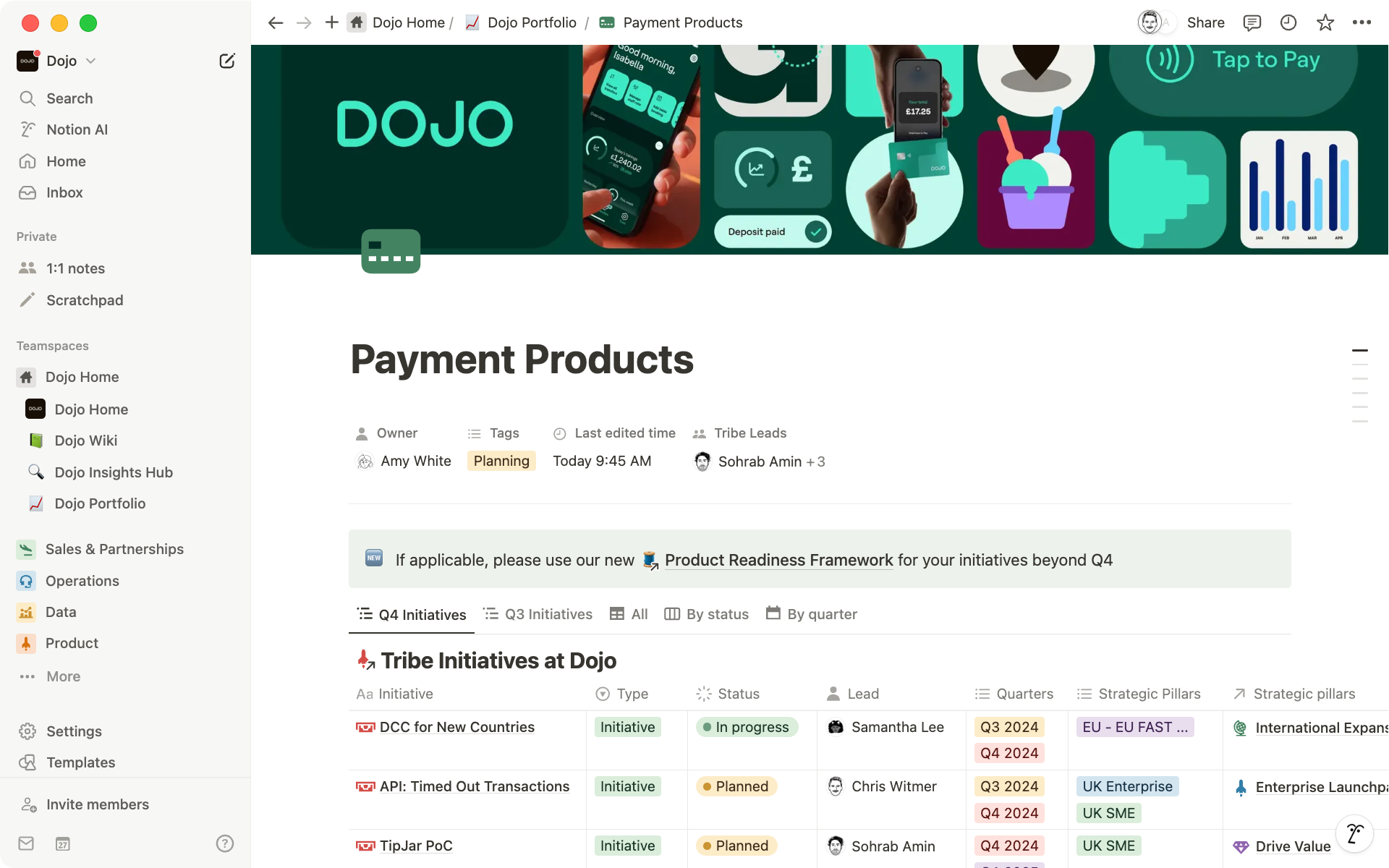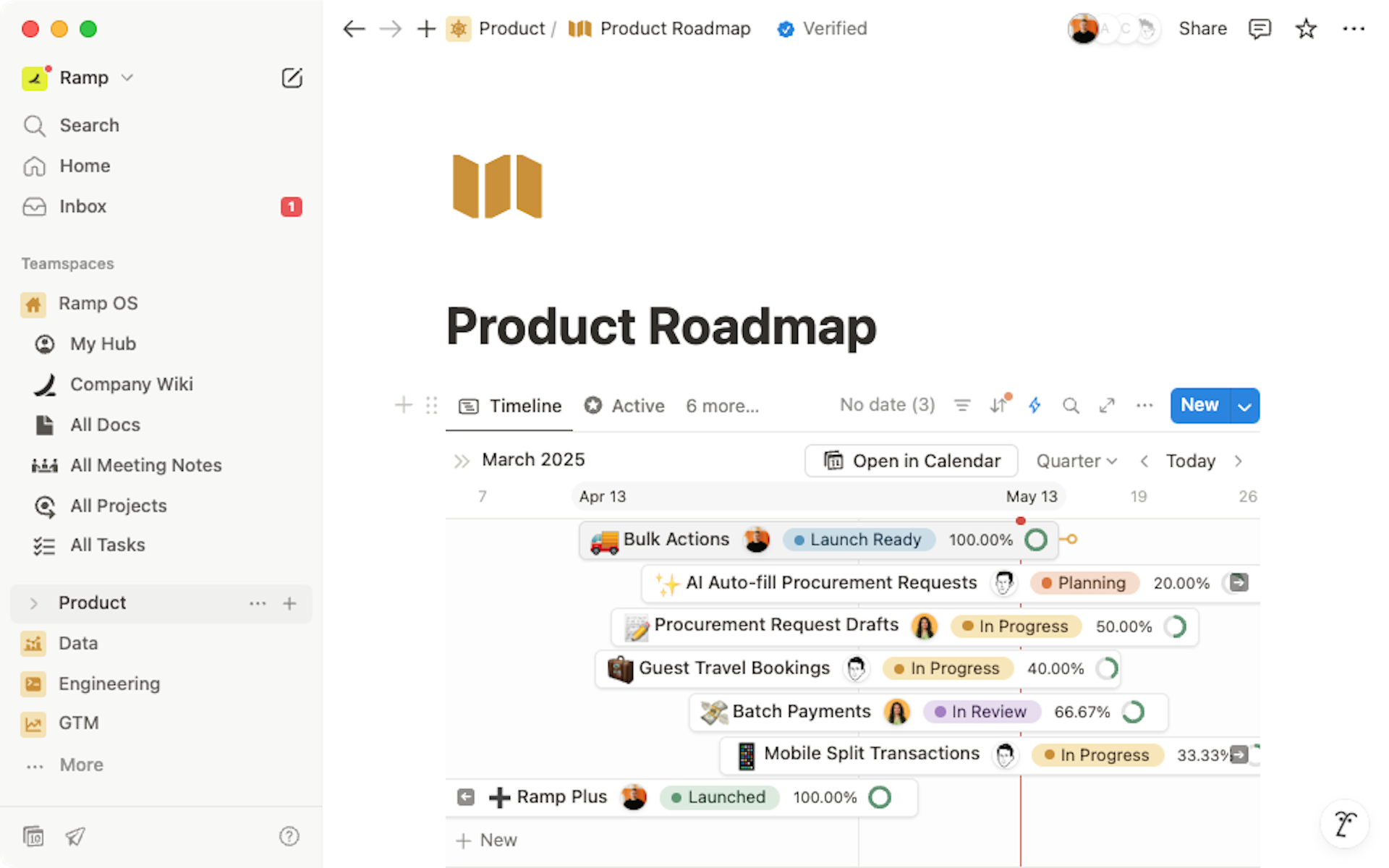Featured Story
How OpenAI turns shared knowledge into faster workflows with Notion

There’s power in a centralized place for your work
When most companies scale, workflows can splinter, information can become more siloed, and valuable thinking can get lost in the shuffle. That’s why OpenAI made a decision during its early days as a research lab with just a few hundred employees: Notion would become a centralized place for how its teams work. Its leaders also saw an opportunity to shape the future of AI-powered work with Notion. This early bet would prove transformative for both companies.
As OpenAI grew rapidly, Notion evolved alongside them—not just as a tool, but as a collaborator in defining how AI could enhance human knowledge work. The tight feedback loop between OpenAI’s teams using Notion daily and Notion’s development of GPT-4-powered features helped accelerate both companies’ visions for AI-assisted collaboration.
Today, from research and engineering to go-to-market, Notion is a centralized place where OpenAI’s ideas, plans, and many decisions flow and flourish into action. With integrations to other tools like Slack and Google Drive, work stays connected. And with Notion AI, powered by OpenAI’s APIs and shaped by real-world usage patterns, teams can instantly find and apply the information they need to keep moving forward.
Our goal is to enable OpenAI teams’ progress with tools that accelerate their expertise, and we’re pleased that Notion continues to help us do that well.

Enabling the research-to-product pipeline
A research lab at its core, OpenAI is dedicated to building safe AGI that benefits all of humanity. The researchers at OpenAI have created living research labs in their Notion teamspace, where plans and discoveries flow seamlessly into product development.
Researchers use Notion to document experiments and track progress in real time, customizing their work in board, list, or timeline views—whatever fits their process best. Their work connects directly to engineers and PMs, as well as to the specialized tools these teams use such as GitHub and Linear. The result is a collaborative, searchable hub that helps teams rapidly build on each other’s work and move faster, together.
“Since product managers, engineers, and designers are involved from the start, the entire product development process stays connected,” notes Karina Nguyen of OpenAI’s research team.

Engineering’s velocity amplifier and always-on assistant
For engineering teams, speed isn’t just about writing code faster. It’s about reducing friction in review cycles and across time zones. At OpenAI, velocity comes from capturing knowledge as it happens and making it instantly accessible. Engineers aren’t just documenting for themselves—they’re building a resource to enable every current and future teammate.
OpenAI’s engineers follow a “campsite principle”: leave the documentation better than you found it. That knowledge becomes especially valuable in high-pressure moments. What one engineer writes down during a routine workday might be the thing that unblocks someone that is new to the team or on-call after hours. And when that moment comes, Notion AI gives them instant access to years of technical knowledge with critical context that’s never lost to time zones or team silos.
Having our technical documentation in Notion means that solutions we discover today become organizational knowledge tomorrow. What used to take hours of debugging can now be solved in minutes just by asking Notion AI.

Making data accessible and actionable
While OpenAI’s research and engineering teams push the boundaries of AI capability, its data-science team uses Notion to make complex operational data accessible, usable, and impactful for the rest of the company.
The team’s solution brings together information across dashboards, spreadsheets, and manual reports into a centralized, automated reporting system. Compute usage, capacity planning, and weekly performance metrics are consolidated in a Notion database of weekly reports. These reports use templates with built-in automations to summarize information and embed dashboards directly from data tools like Mode and Databricks.
Teams spend less time switching between tools, and product and engineering leaders get faster visibility into the metrics that shape OpenAI’s roadmap. The system saves over an hour of reporting prep each week. More importantly, it ensures critical insights reach the right teams at the moment they need them.

The ability to turn complex data analyses into readable, accessible documentation has been game-changing. By sharing weekly reports in Notion, our technical insights now reach a broader audience and drive better decision-making across the organization.

A faster, global GTM engine
In a fast-moving market, OpenAI’s GTM team needs to stay ahead of changing customer needs with adaptable, scalable processes designed for rapid growth and evolution.
That’s where Notion comes in. It’s now a central hub where market insights and internal knowledge can flow together—and where those learnings loop back into strategy and product development.
The team has built a GTM-enablement hub in Notion—a central database organizing hundreds of pieces of content, from messaging and positioning to playbooks and customer stories that connect to a related product-release database. With Notion AI, team members can get what they need instantly, whether it’s preparing for a sales call about the latest launch or onboarding a new teammate. As OpenAI’s GTM team continues to scale, the hub ensures everyone stays aligned and informed.
For me, Notion is the difference between ending the day feeling like I just have all these things in my mind and I can’t get it to shut off, and ending the day organized and having all the things that I need in one place.

The impact of centralized work and knowledge
What sets OpenAI apart is its speed. With Notion, insights are captured and applied as knowledge that’s actionable across the company. Their workspace seamlessly connects knowledge across the company and their broader ecosystem of tools, minimizing silos and enabling research, data insights, engineering solutions, and market learnings to flow more freely.
This foundation of shared knowledge and collaboration enables OpenAI to innovate and move quickly. As plans evolve into products and ideas become best practices, their teams stay connected, aligned, and driven toward their mission.



